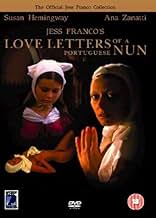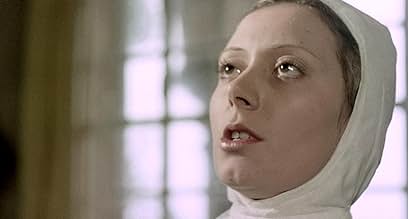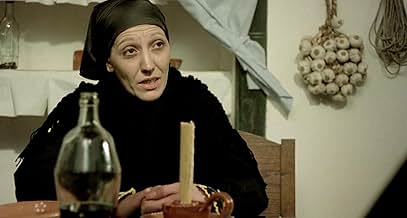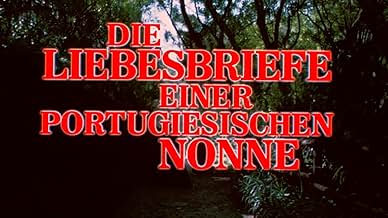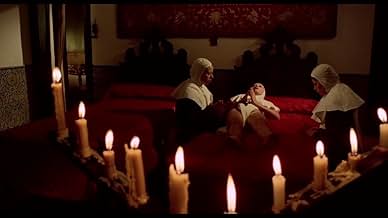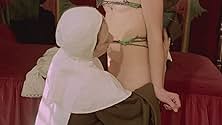Confessioni proibite di una monaca adolescente
Titolo originale: Die Liebesbriefe einer portugiesischen Nonne
VALUTAZIONE IMDb
5,4/10
1354
LA TUA VALUTAZIONE
Aggiungi una trama nella tua lingua16-year-old Maria is forced into Serra D'Aires convent, secretly run by Satanists.16-year-old Maria is forced into Serra D'Aires convent, secretly run by Satanists.16-year-old Maria is forced into Serra D'Aires convent, secretly run by Satanists.
- Regia
- Sceneggiatura
- Star
Aida Vargas
- Joanna, a Nun
- (as Aida Kargas)
Vítor Mendes
- António Fernando Queiroz de Melo, the Mayor
- (as Victor Mendés)
Aida Gouveia
- Antónia, a Nun
- (as Isa Schneider)
Herman José
- Manuel Gonçalves, the Prince
- (as Hermann Krippahl)
José Viana
- The Grand Inquisitor
- (as Jose Viana)
Patrícia Leal
- Maria's Mother
- (as Patricia Da Silva)
Recensioni in evidenza
Love Letters of a Portuguese Nun is a surprisingly professionally made movie from the king of sleaze, Jess Franco. Usually with Franco, you can count on a very thin plot and loads of sex (usually involving lesbians), but this time it's the other way round. Of course, there's still lots of room for sex (no need to worry, Franco fans) but it's definitely a secondary element to the plot. This film fits into the corner of the horror genre known as 'nunsploitation'. This is my first ever taste of nunsploitation, so I cant comment on the niche on the whole; but if it turns out to be as interesting as it's title, it should be pretty good! This film follows Maria, a sixteen year old girl that is forced into a convent after the convent's leader manipulates her mother into thinking she's in league with the devil and destined for Hell. However, this isn't a Christian convent and rather than worshipping God, these guys are actually a band of Satanists! After being forced to perform sinful acts with various members of the convent (including the Dark Prince himself...), Maria tries to escape the convent.
The message in this film is actually rather potent, and it exposes the hypocrisy of religion and, more specifically; the Christian church. The film manages to go even further than that too, with the idea of a sex scandal being pretty much timeless. Sex scandals are still a big part of our society's news stories, and I'm sure that they will continue to be; which gives this film an element of immortality where it's plot is concerned. The sex scenes are surprisingly brief, which is very surprising after watching the likes of Vampyros Lesbos and Bare Breasted Countess. The photography is smooth and nice to look at, leading me to believe that Jess Franco actually wanted to make a film, rather than just another of his usual quickies. Jess Franco made a lot of films over his career, a lot of which are forgettable rubbish; but this film hints that the man may have a lot more talent than his list of directorial credits suggests. Despite some silly sequences (such the Devil love making scene), this film is professionally handled and just well done on the whole. Maybe if Franco had put more effort into the quality of his films rather than the quantity, he would have a few masterpieces under his belt.
The message in this film is actually rather potent, and it exposes the hypocrisy of religion and, more specifically; the Christian church. The film manages to go even further than that too, with the idea of a sex scandal being pretty much timeless. Sex scandals are still a big part of our society's news stories, and I'm sure that they will continue to be; which gives this film an element of immortality where it's plot is concerned. The sex scenes are surprisingly brief, which is very surprising after watching the likes of Vampyros Lesbos and Bare Breasted Countess. The photography is smooth and nice to look at, leading me to believe that Jess Franco actually wanted to make a film, rather than just another of his usual quickies. Jess Franco made a lot of films over his career, a lot of which are forgettable rubbish; but this film hints that the man may have a lot more talent than his list of directorial credits suggests. Despite some silly sequences (such the Devil love making scene), this film is professionally handled and just well done on the whole. Maybe if Franco had put more effort into the quality of his films rather than the quantity, he would have a few masterpieces under his belt.
The first I've seen of the films Jess Franco made for producer Erwin C. Dietrich and, frankly, one of only three or four I'm really interested in (the others being DORIANA GREY [1976], JACK THE RIPPER [1976] and SEXY SISTERS [1977]). Having viewed this immediately after THE DEMONS (1972), I'm thankful it has proven to be a whole lot better, thus living up to its unanimously positive reputation online ever since it was released on DVD; definitely one of Franco's best (currently ranking at No. 7 out of only 18 I've watched so far).
From the very first moments (starting off with a much more fitting 'medieval' score than THE DEMONS' eclectic if messy soundtrack), the film conveys both its seriousness of intent (neither THE BLOODY JUDGE [1970] nor THE DEMONS could be taken as anything but fanciful peeks into this controversial yet intriguing time-frame) and its artistic bent (certainly among Franco's most gorgeous-looking films, evident even in the VHS copy I viewed). The film is very well directed for the most part: stylized but highly effective framing (notably the shot where William Berger is forcing himself onto Susan Hemingway) and positioning of actors (the orgy where Hemingway is again raped, now by Herbert Fux's devil incarnate, while all the time her head is resting on Ana Zanatti's shoulder, who seems to be getting her sexual kicks by proxy!). The nick-of-time ending is effectively handled as well, especially its fading out on the two villains' apprehension leaving their eventual fate, as it were, to each and every member of the audience!
The acting of the three principals is terrific:
· Susan Hemingway manages both the character's inherent innocence as well as her determination to put a stop to all the evil at the Abbey (I quite liked the fact that when she finally escapes, we are not shown how she achieves this, and also the matter-of-fact yet rather moving way her 'love letters' are eventually picked up) [Brief parenthesis: I look forward to seeing more of her in Franco's SINFONIA EROTICA (1979), paired with the equally scrumptious Lina Romay who, incidentally, appeared in a remake of LOVE LETTERS OF A Portuguese NUN made by Jorge Grau in 1978!]
· William Berger as the sickest priest ever to hit the screen (far more damaging than the befuddled monk played by Jack Palance in MARQUIS DE SADE'S JUSTINE [1968]), who immediately demonstrates he is adept at persuading virtually anyone to do his bidding (the calm way he haggles Hemingway's poor and impressionable mother out of her savings at the beginning of the film, for instance, but also the girl herself during a humiliating confession scene that just about manages not to topple over into unnecessary grossness and emerges, in fact, as one of the film's highlights)
· Ana Zanatti, however, matches Berger with her proud (and evidently possessed) Mother Superior-cum-High Priestess, creating what is perhaps one of Franco's most fascinating female villains
What I couldn't quite figure out initially about LOVE LETTERS OF A Portuguese NUN is its apparently schizophrenic nature: while it takes the utmost care in establishing period atmosphere and the mood of specific scenes, and doing so with great subtlety (as in the almost subliminal but potentially repugnant shot where Hemingway's face is hit by a rush of semen), the film then goes overboard with its frequent depiction of sexual activity among the nuns and their unmitigated devotion to Satan (as if the agenda of this so-called Abbey hadn't been made blatant already!). That said, the scene where Zanatti painfully confirms her 'faith' (which reminded me of a similarly excruciating moment in the last of the Hammer horror films, Peter Sykes' contemporaneous TO THE DEVIL A DAUGHTER [1976]) is well done as are, in fact, the various tortures to which lovely Susan Hemingway is subjected for her defiance of the 'house' rules. [In any case, Francesco Cesari once again came to the rescue for me, putting the sex scenes in their proper context which is that, in their pursuit to 'demonize' sexuality, the Catholic Church has rendered the Devil a sexual object leading to a general perversion in sexuality which 'disease' actually sprang from within the convents themselves! Apart from this, Francesco has rightly observed that, before we even get to see how truly evil they are, the characters of Father Vincent and Mother Alma are themselves depicted in the film as wretched human beings indicating, in this way, that they are as much victims of this same culture as anyone else!]
I wouldn't mind buying the film on DVD (in view of the proper Widescreen ratio and VIP's restoration efforts) though the price-tag of the Swiss DVD is set rather too highly for my tastes; I only hope, therefore, that Anchor Bay UK (a DVD is planned for a February 2004 release) can pull this one intact from under the BBFC's scrutiny
Much as Franco's THE BLOODY JUDGE was made in the wake of the classic WITCHFINDER GENERAL (1968), his THE DEMONS and LOVE LETTERS OF A Portuguese NUN emerged from the relative success and eventual cult-status of Ken Russell's original 'nunsploitation' epic THE DEVILS (1971); I wouldn't say that Franco necessarily did a better job of it but, thankfully, his efforts did not prove so hysterical as Russell's either! (Actually, watching these two films has reminded me that I've yet to pick up Walerian Borowczyk's similar BEHIND CONVENT WALLS (1977) on R2 DVD from Nouveaux Pictures.)
P.S. The film's 'message' is still timely, especially since here in Malta a sex-scandal was recently unearthed involving priests' abusing of their young male charges(!); incidentally, the religious order involved is affiliated with the Secondary school which my brother and I attended between 1987 and 1992 come to think of it, once we even spent a whole week-end at their convent!!
From the very first moments (starting off with a much more fitting 'medieval' score than THE DEMONS' eclectic if messy soundtrack), the film conveys both its seriousness of intent (neither THE BLOODY JUDGE [1970] nor THE DEMONS could be taken as anything but fanciful peeks into this controversial yet intriguing time-frame) and its artistic bent (certainly among Franco's most gorgeous-looking films, evident even in the VHS copy I viewed). The film is very well directed for the most part: stylized but highly effective framing (notably the shot where William Berger is forcing himself onto Susan Hemingway) and positioning of actors (the orgy where Hemingway is again raped, now by Herbert Fux's devil incarnate, while all the time her head is resting on Ana Zanatti's shoulder, who seems to be getting her sexual kicks by proxy!). The nick-of-time ending is effectively handled as well, especially its fading out on the two villains' apprehension leaving their eventual fate, as it were, to each and every member of the audience!
The acting of the three principals is terrific:
· Susan Hemingway manages both the character's inherent innocence as well as her determination to put a stop to all the evil at the Abbey (I quite liked the fact that when she finally escapes, we are not shown how she achieves this, and also the matter-of-fact yet rather moving way her 'love letters' are eventually picked up) [Brief parenthesis: I look forward to seeing more of her in Franco's SINFONIA EROTICA (1979), paired with the equally scrumptious Lina Romay who, incidentally, appeared in a remake of LOVE LETTERS OF A Portuguese NUN made by Jorge Grau in 1978!]
· William Berger as the sickest priest ever to hit the screen (far more damaging than the befuddled monk played by Jack Palance in MARQUIS DE SADE'S JUSTINE [1968]), who immediately demonstrates he is adept at persuading virtually anyone to do his bidding (the calm way he haggles Hemingway's poor and impressionable mother out of her savings at the beginning of the film, for instance, but also the girl herself during a humiliating confession scene that just about manages not to topple over into unnecessary grossness and emerges, in fact, as one of the film's highlights)
· Ana Zanatti, however, matches Berger with her proud (and evidently possessed) Mother Superior-cum-High Priestess, creating what is perhaps one of Franco's most fascinating female villains
What I couldn't quite figure out initially about LOVE LETTERS OF A Portuguese NUN is its apparently schizophrenic nature: while it takes the utmost care in establishing period atmosphere and the mood of specific scenes, and doing so with great subtlety (as in the almost subliminal but potentially repugnant shot where Hemingway's face is hit by a rush of semen), the film then goes overboard with its frequent depiction of sexual activity among the nuns and their unmitigated devotion to Satan (as if the agenda of this so-called Abbey hadn't been made blatant already!). That said, the scene where Zanatti painfully confirms her 'faith' (which reminded me of a similarly excruciating moment in the last of the Hammer horror films, Peter Sykes' contemporaneous TO THE DEVIL A DAUGHTER [1976]) is well done as are, in fact, the various tortures to which lovely Susan Hemingway is subjected for her defiance of the 'house' rules. [In any case, Francesco Cesari once again came to the rescue for me, putting the sex scenes in their proper context which is that, in their pursuit to 'demonize' sexuality, the Catholic Church has rendered the Devil a sexual object leading to a general perversion in sexuality which 'disease' actually sprang from within the convents themselves! Apart from this, Francesco has rightly observed that, before we even get to see how truly evil they are, the characters of Father Vincent and Mother Alma are themselves depicted in the film as wretched human beings indicating, in this way, that they are as much victims of this same culture as anyone else!]
I wouldn't mind buying the film on DVD (in view of the proper Widescreen ratio and VIP's restoration efforts) though the price-tag of the Swiss DVD is set rather too highly for my tastes; I only hope, therefore, that Anchor Bay UK (a DVD is planned for a February 2004 release) can pull this one intact from under the BBFC's scrutiny
Much as Franco's THE BLOODY JUDGE was made in the wake of the classic WITCHFINDER GENERAL (1968), his THE DEMONS and LOVE LETTERS OF A Portuguese NUN emerged from the relative success and eventual cult-status of Ken Russell's original 'nunsploitation' epic THE DEVILS (1971); I wouldn't say that Franco necessarily did a better job of it but, thankfully, his efforts did not prove so hysterical as Russell's either! (Actually, watching these two films has reminded me that I've yet to pick up Walerian Borowczyk's similar BEHIND CONVENT WALLS (1977) on R2 DVD from Nouveaux Pictures.)
P.S. The film's 'message' is still timely, especially since here in Malta a sex-scandal was recently unearthed involving priests' abusing of their young male charges(!); incidentally, the religious order involved is affiliated with the Secondary school which my brother and I attended between 1987 and 1992 come to think of it, once we even spent a whole week-end at their convent!!
Jess Franco's "Love Letters of a Portuguese Nun" is the perfect film to show anyone who thinks all that Jess Franco is capable of is zooming in and out of tasteless sex scenes. Instead of his usual epileptic zooms, the cinematography in this is measured and carefully composed. The acting is also another plus. William Berger's portrayal as the Father Confessor is the epitome of slime and pretense. Let's not forget Susan Hemingway and her effortless performance as the innocent heroine of the title. In closing, this is a MUST-SEE picture and proof that Franco could make a film that would cater to the arthouse crowd.
Jesus Franco's dark yet artistic sexploitation movie concerns Maria Rosalea (Susan Hemmingway), a fifteen year old girl, who is caught cavorting with her boyfriend by the devilish Father Vicente (William Berger). Vicente convinces Maria's poor and easily intimidated, God-fearing mother (Aida Vargas) to force Maria into a convent. Upon arriving at the convent Maria is subjected to numerous vile and sadistic sexual tortures, and it becomes increasingly clear that it is not God that these particular nuns worship.
It is fairly easy to speculate whether 'Love Letters of a Portuguese Nun' is a film with a message or not. It would appear to be a film damning the historical atrocities of the Catholic Church, and while perhaps over exaggerating the real truth (though one may never know for sure), the portrayal of how the Catholic Church abused it's power, particularly during the 16th-19th centuries, seems to be effectively represented here. In fact, to this very day, there is still news making the headlines about the darker side of religion, including the vile sexual abuse that is often covered up the Church itself and carried out by those who are supposed to spread the word of God. While not meaning to sound anti-religious, 'Love Letters of a Portuguese Nun' is a film that is not afraid to push the boundaries of acceptability all the way and condemn the wrong doings in the Church. Bordering on illegal, with frequent horrific representations of a fifteen year old girl naked and/or suffering, what can only be described as sadistic sexual abuse, 'Love Letters of a Portuguese Nun' is a gloomy, yet surprisingly powerful, artistic and thought-provoking film.
Although the scripting occasionally left a lot to be desired, particularly in the scenes involving the Prince of Portugal (Herman Jose), generally the script was very tight, and the dialogue enormously effective. It becomes very easy to empathise with Maria as she suffers the numerous horrid indignities. While I am unable to comment on the verbal acting ability of Susan Hemmingway in this film (as I watched the film with English dubbing), the physical performance of Susan was highly realistic and there is little way that one cannot feel sympathy for this poor, young girl. William Berger's physical performance was also of a high standard and it becomes very easy to feel contempt for this sleazy and perverted man. The confessional masturbation scene early in the movie showed exactly how depraved and corrupt this so-called `good man' was. Berger was also complimented by the addition of Ana Zanatti in the role of Mother Superior, Alma. Zanatti added a loathsome female character which seemingly exhibited more savagery than the despicable Vicente.
Although some may find the occasional scenes of lesbianism portrayed within the movie more titillating than necessary, they still maintain an artistic air and help create an image, for the viewer, of the real actions within the convent. There are numerous scenes of nudity and sexual acts, but the majority of these are more repulsive than erotic. Outside of the eroticism/sexual deviances, 'Love Letters of a Portuguese Nun' is generally aesthetically pleasing as it was shot in some beautiful locations, and featured many scenes of glorious gothic architecture. An early comment on how beautiful the Abbey featured in 'Love Letters.' rings so true, and serves to underline the ignorance to the truth that both the church, and the village as a whole possesses. This imaginative and artistically presented film is certainly worth viewing for fans of similar movies, particularly those who enjoy European arthouse eroticism. My rating for 'Love Letters of a Portuguese Nun' - 7/10.
It is fairly easy to speculate whether 'Love Letters of a Portuguese Nun' is a film with a message or not. It would appear to be a film damning the historical atrocities of the Catholic Church, and while perhaps over exaggerating the real truth (though one may never know for sure), the portrayal of how the Catholic Church abused it's power, particularly during the 16th-19th centuries, seems to be effectively represented here. In fact, to this very day, there is still news making the headlines about the darker side of religion, including the vile sexual abuse that is often covered up the Church itself and carried out by those who are supposed to spread the word of God. While not meaning to sound anti-religious, 'Love Letters of a Portuguese Nun' is a film that is not afraid to push the boundaries of acceptability all the way and condemn the wrong doings in the Church. Bordering on illegal, with frequent horrific representations of a fifteen year old girl naked and/or suffering, what can only be described as sadistic sexual abuse, 'Love Letters of a Portuguese Nun' is a gloomy, yet surprisingly powerful, artistic and thought-provoking film.
Although the scripting occasionally left a lot to be desired, particularly in the scenes involving the Prince of Portugal (Herman Jose), generally the script was very tight, and the dialogue enormously effective. It becomes very easy to empathise with Maria as she suffers the numerous horrid indignities. While I am unable to comment on the verbal acting ability of Susan Hemmingway in this film (as I watched the film with English dubbing), the physical performance of Susan was highly realistic and there is little way that one cannot feel sympathy for this poor, young girl. William Berger's physical performance was also of a high standard and it becomes very easy to feel contempt for this sleazy and perverted man. The confessional masturbation scene early in the movie showed exactly how depraved and corrupt this so-called `good man' was. Berger was also complimented by the addition of Ana Zanatti in the role of Mother Superior, Alma. Zanatti added a loathsome female character which seemingly exhibited more savagery than the despicable Vicente.
Although some may find the occasional scenes of lesbianism portrayed within the movie more titillating than necessary, they still maintain an artistic air and help create an image, for the viewer, of the real actions within the convent. There are numerous scenes of nudity and sexual acts, but the majority of these are more repulsive than erotic. Outside of the eroticism/sexual deviances, 'Love Letters of a Portuguese Nun' is generally aesthetically pleasing as it was shot in some beautiful locations, and featured many scenes of glorious gothic architecture. An early comment on how beautiful the Abbey featured in 'Love Letters.' rings so true, and serves to underline the ignorance to the truth that both the church, and the village as a whole possesses. This imaginative and artistically presented film is certainly worth viewing for fans of similar movies, particularly those who enjoy European arthouse eroticism. My rating for 'Love Letters of a Portuguese Nun' - 7/10.
Tsk, tsk
. My poor, old and deeply religious granny should know what I'm watching here. Nunsploitation! Foxy looking nuns doing tricks with their willing and ravishing bodies, in blood-soaked and satanic-themed movies! Blasphemy, my old granny would call it
and she would be right as well. Call it what you want
it's still fun! It's pretty deranged to see a bunch of nuns bringing sacrifices to Satan. And it's even more messed up to see Lucifer actually appear then and sexually violate an innocent young disciple. Who else than Jess Franco could have been responsible for this? The Godfather of Sleaze tried out every subgenre of eurohorror in his long, fertile career and this stylish, well cinematographed film represents his bizarre nun-fantasies. A young girl named Marie played by Susan Hemingway is caught fooling around with her boyfriend by a frustrated priest. He intimidates her poor mother to force her into a convent. The nuns there, led by Alma Mater Ana Zanetti (who looks a lot like an exquisite version of Susan Sarandon, take unusual interest in her young and sensual body. Lovely convent this is! Mother Superior is a horny devil-worshipper and the priest is a perverted masturbator! Which brings me to the MESSAGE of this film! Yes indeed, message! Jess Franco's films don't often carry a message but this `Love Letters from a Portuguese Nun' does. Franco directly criticizes the historical hypocrisy of the Catholic Church and shows how Catholic superiors abused their powers. This really is one of Franco's finest achievements. Although the film exaggerates extremely when it comes to sleaziness and absurd situations, it also brings forward a lot of style and beauty. The acting is above average and the locations are beautifully chosen. The best aspect about the whole film is the truly magnificent music by Walter Baumgartner, who made a career out of filling exploitation soundtracks. Love Letters from a Portuguese Nun may not be top-quality cinema, but it shows a lot of goodwill and depth. And it's beautiful to look at. Hallelujah!
Lo sapevi?
- QuizThe film was complete in 1975, but it went through a number of censorship bans (the first on 3 March 1976), appeals, rejections, and editing for release in different markets in 1977 and 1978.
- ConnessioniFeatured in Peter Baumgartner, Filmkameramann (2014)
I più visti
Accedi per valutare e creare un elenco di titoli salvati per ottenere consigli personalizzati
- How long is Love Letters of a Portuguese Nun?Powered by Alexa
Dettagli
- Data di uscita
- Paesi di origine
- Lingua
- Celebre anche come
- Love Letters of a Portuguese Nun
- Luoghi delle riprese
- Aziende produttrici
- Vedi altri crediti dell’azienda su IMDbPro
Contribuisci a questa pagina
Suggerisci una modifica o aggiungi i contenuti mancanti

Divario superiore
What is the Spanish language plot outline for Confessioni proibite di una monaca adolescente (1977)?
Rispondi

